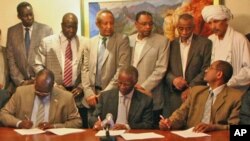North and South Sudan have reached a landmark agreement outlining the status of the disputed Abyei border region. The Abyei deal paves the way for progress on several other issues that need to be settled before the South’s July 9 independence.
Monday’s brief signing ceremony followed days of agonizing wrangling over words, while news from Sudan told of deadly clashes in two border regions and a developing humanitarian catastrophe.
An obviously relieved chief mediator, former South African president Thabo Mbeki, said the agreement calls for a complete demilitarization of Abyei and deployment of a U.N.-mandated Ethiopian peacekeeping force.
"The Sudan Armed Forces that are there will pull out, will be redeployed out of Abyei, as well as any other military forces in the area, like if the SPLA [Sudan People’s Liberation Army] are there they would leave, to be replaced by Ethiopian forces, which will then move as soon as they are authorized by the United Nations," Mbeki said.
Mbeki said a brigade of Ethiopian peacekeepers could be in Abyei within days, once the United Nations gives the go-ahead.
"We have to wait until the Security Council gives its mandate. But as soon as that’s done, that will tell us how soon they will be able to move," he said. "If we had it our way they should move today, and as I say the Ethiopians are ready to move at a very short notice."
Mbeki went directly from the signing ceremony to the United Nations conference center in Addis Ababa to brief the Security Council by video conference.
U.S. Ambassador Susan Rice said a draft resolution authorizing the Abyei security force soon would be circulated.
The former South African leader told reporters the issue that had held up the talks, and threatened to sink the negotiations, had been over the makeup of the Abyei administration. Southerners had been outraged last month when the Khartoum government sent troops into Abyei’s main town and disbanded the administrative body that had been controlled by the South.
The agreement signed Monday calls for the body to be reconstituted as it was, but with limited powers. Responsibility for security will be transferred to a joint committee that would include a member appointed by the African Union Commission.
Mbeki said the deal clears the way for displaced residents to return home and establishes a solid footing for talks on Abyei’s final status, to be held after the South’s July 9 independence day.
"So these measures would be put in place in restoring peace to Abyei because both sides have agreed that you could not come to the final matter of determining the final status of Abyei until you had stabilized the security situation and taken all these matters to ensure there will be no further conflict in this area," said Mbeki.
The Abyei deal was seen as the linchpin of wide-ranging talks on sensitive issues, such as sharing oil revenues and dividing Sudan’s $38 billion debt. Those talks began during the past few days.
Mbeki said talks would start Tuesday on Southern Kordofan, the northern border state where government troops have been battling forces loyal to the South for weeks. Hopes have faded for a humanitarian cease-fire that would allow emergency supplies to reach as many as half a million civilians trapped by the fighting.
Sudanese Parties Sign Abyei Border Deal




